Social media influencers have a strong presence in the region. At least half of nationals in each country say they look at posts or stories from social media influencers. Nationals in the Gulf countries are more likely than other Arab nationals to look at stories and posts from social influencers. Moreover, about a third of nationals look at posts from social media influencers every day, ranging from two in 10 in Tunisia to four in 10 in Qatar and the UAE.
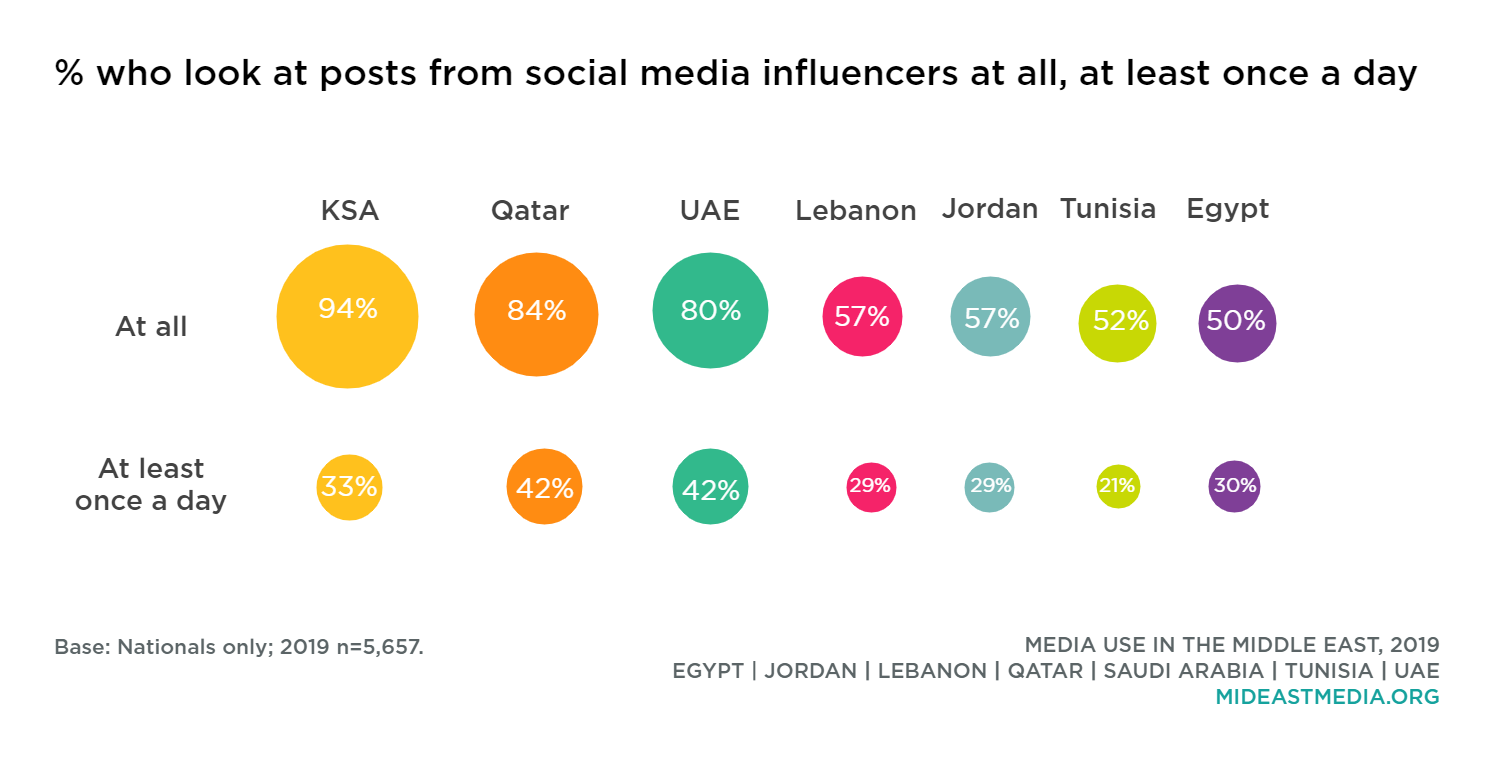
The youngest nationals (18-24) are more likely to pay attention to social media influencers, but notably, more than a third of the oldest age group (45+) also looks at posts or stories from influencers (78% 18-24-year-olds, 72% 25-34 year-olds, 60% 35-44 year-olds, 37% 45+ year-olds). In terms of frequency, four in 10 of the youngest age group say they look at posts from social media influencers every day, three times the rate of the oldest nationals (42% 18-24 year-olds, 34% 25-34 year-olds, 26% 35-44 year-olds, 14% 45+ year-olds).
Non-nationals in the region are more likely than nationals to follow social media influencers. About nine in 10 Asian and Western expats say they look at posts and stories from social media influencers at all, and half do so every day (at all: 62% Nationals, 79% Arab expats, 89% Asian expats, 95% Western expats; at least once a day: 30% Nationals, 42% Arab expats, 51% Asian expats, 52% Western expats).
Instagram is the most popular platform for looking at posts from social media influencers, followed by Facebook and Snapchat, among nationals who use each of these platforms. On a country by country basis and among users of each platform, respondents most often use Instagram to follow social media influencers in most countries, with a few exceptions. Twitter is most popular in Lebanon, and Snapchat is most popular in Jordan to look for posts and stories from social media influencers.
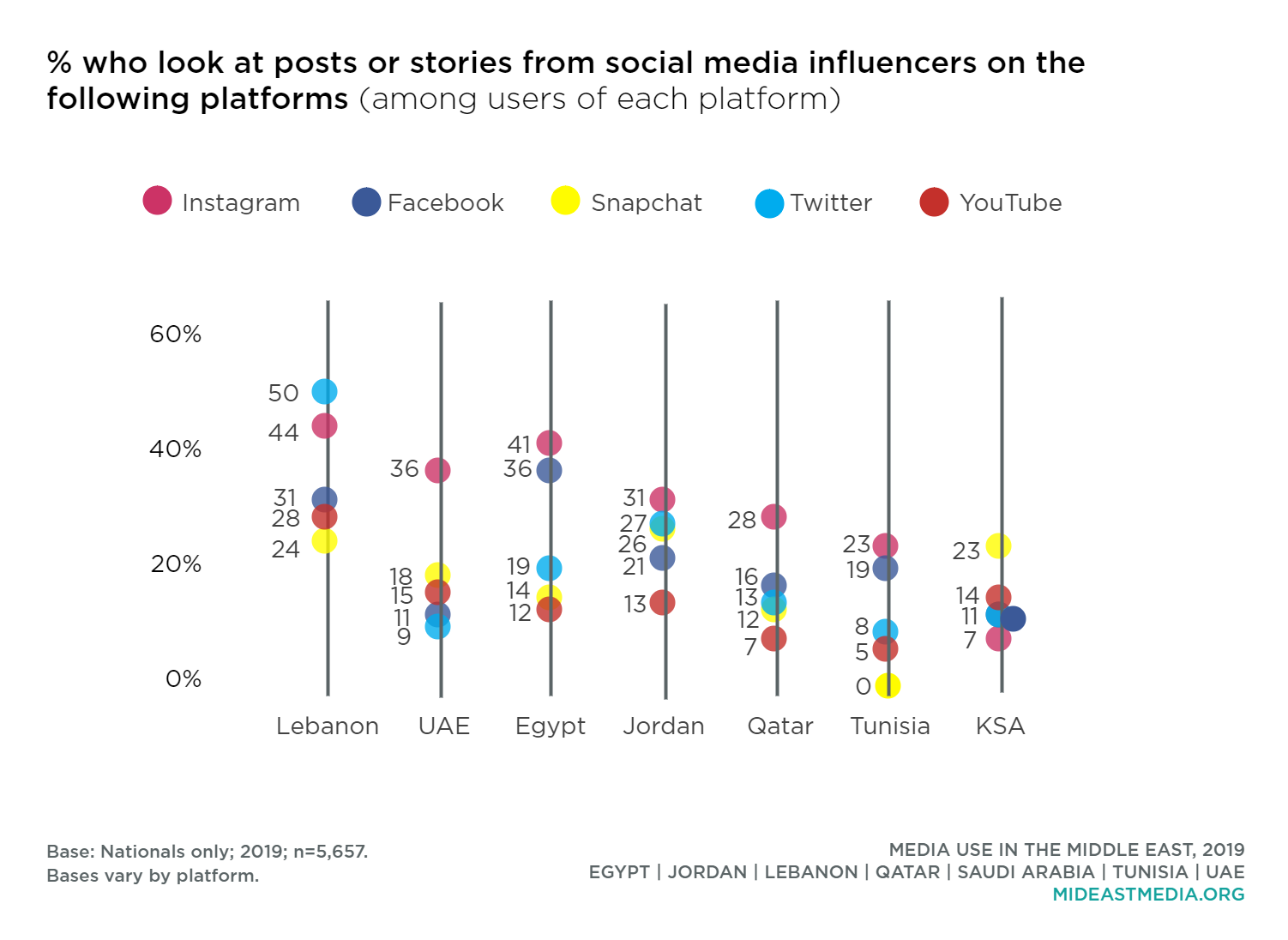
Nationals and non-nationals generally use similar platforms to follow social media influencers, but nationals are more likely than non-nationals to follow influencers on Facebook and Twitter.
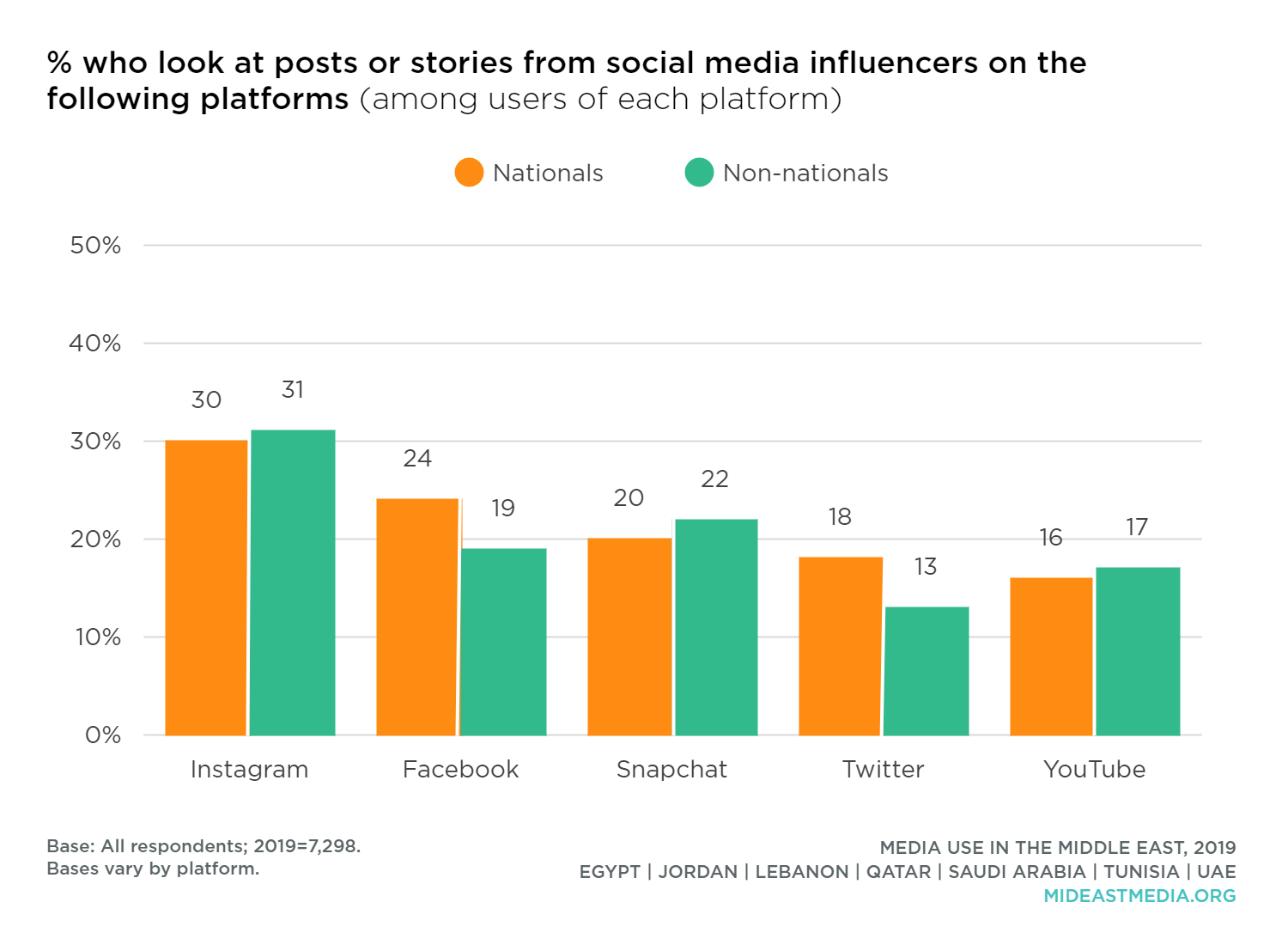
Among users of each platform, all age groups use similar platforms to access content from social media influencers, with one notable exception: the youngest nationals are the most likely cohort to follow social media influencers on Instagram. Among Instagram users, 34% of 18-24 year-olds, 27% of 25-34 year-olds, 29% of 35-44 year-olds, and 22% of 45+ year-olds use this platform to follow social media influencers. In fact, 20% of all 18-24 year-olds follow social media influencers on Instagram, far more than any other age cohort.
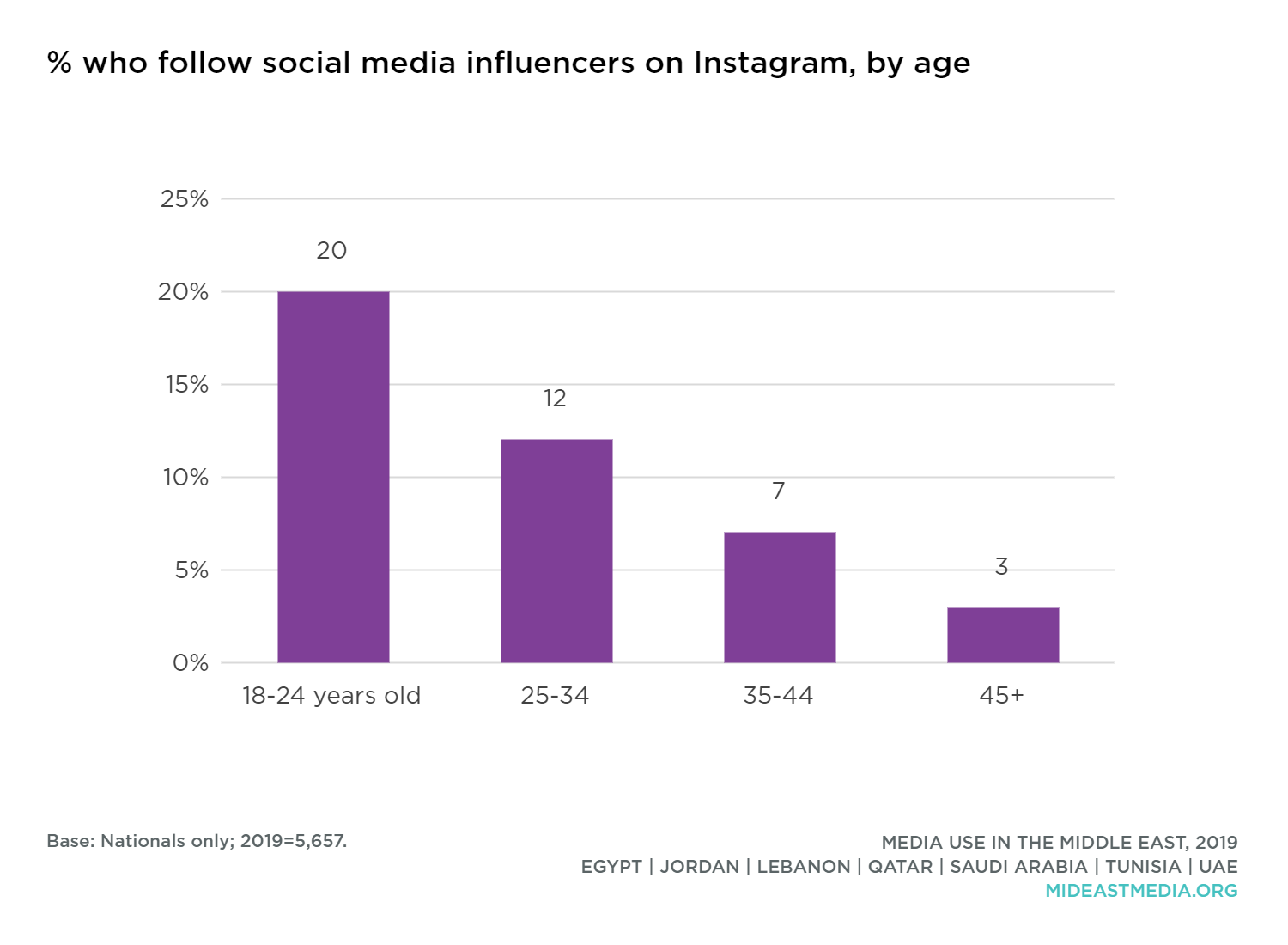
Many nationals not only look at posts from social media influencers, but also interact with them, especially majorities in the Arab Gulf states. Interacting with social media influencers is less common among Egyptians and Tunisians than nationals of other countries. Many nationals say they follow, like, or share posts from social media influencers, but less common is actively engaging or taking action based on influencers’ views and opinions.
One in four Qataris and Saudis and one-third of Emiratis say they act upon influencers’ commercial recommendations, and at least one in four Saudis and Emiratis subscribe to influencers’ accounts/channels or actively engage with them such as posting comments or asking questions. Fewer nationals overall say they adopt the political, religious, or cultural views of social media influencers, but Saudis and Emiratis are more inclined to do so than nationals from other countries.
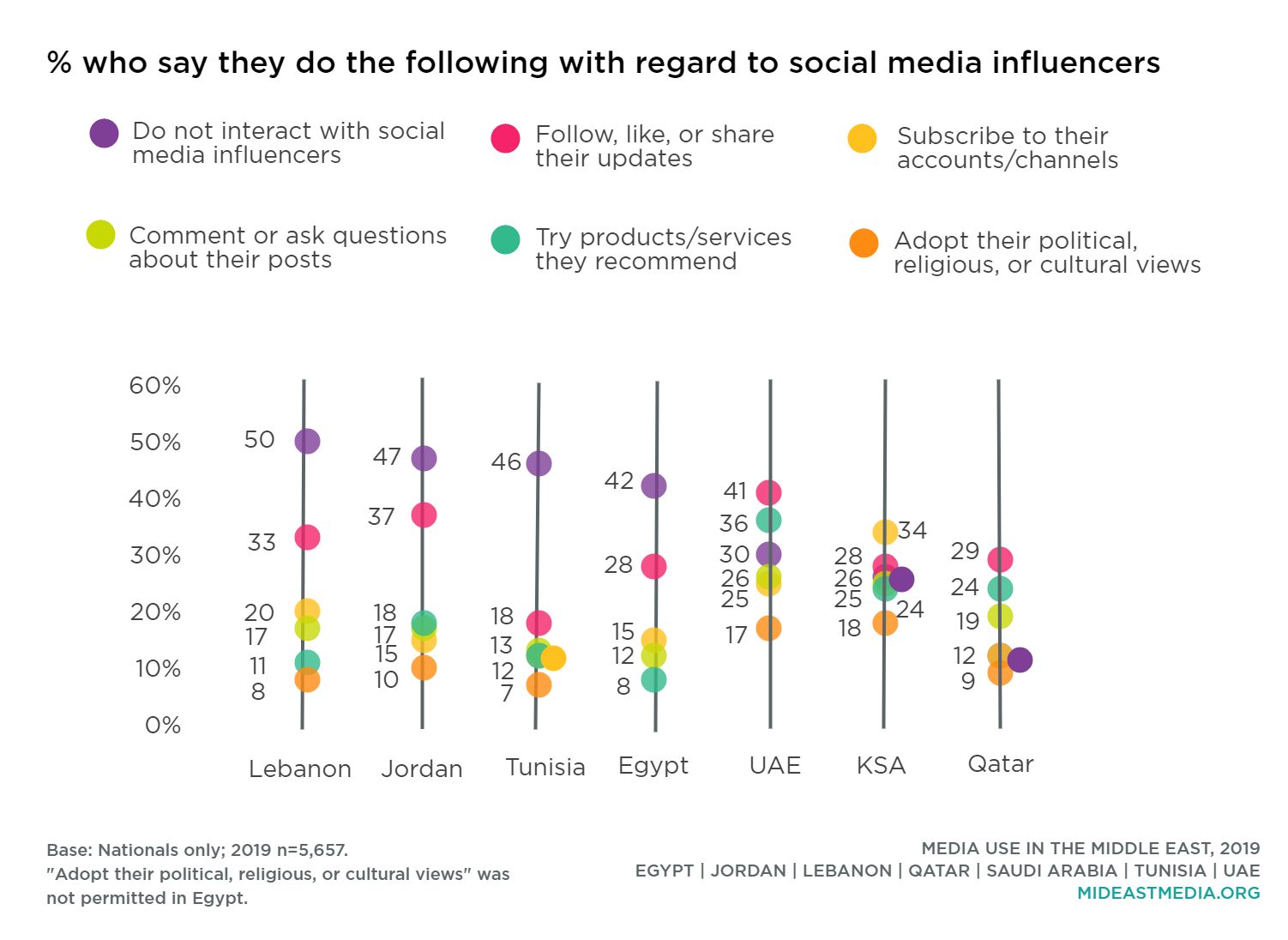
Non-nationals are far more likely to interact with social media influencers than nationals—by roughly 20 percentage points. Notably, non-nationals are twice as likely as nationals to act upon influencers’ recommendations (31% vs. 15%).
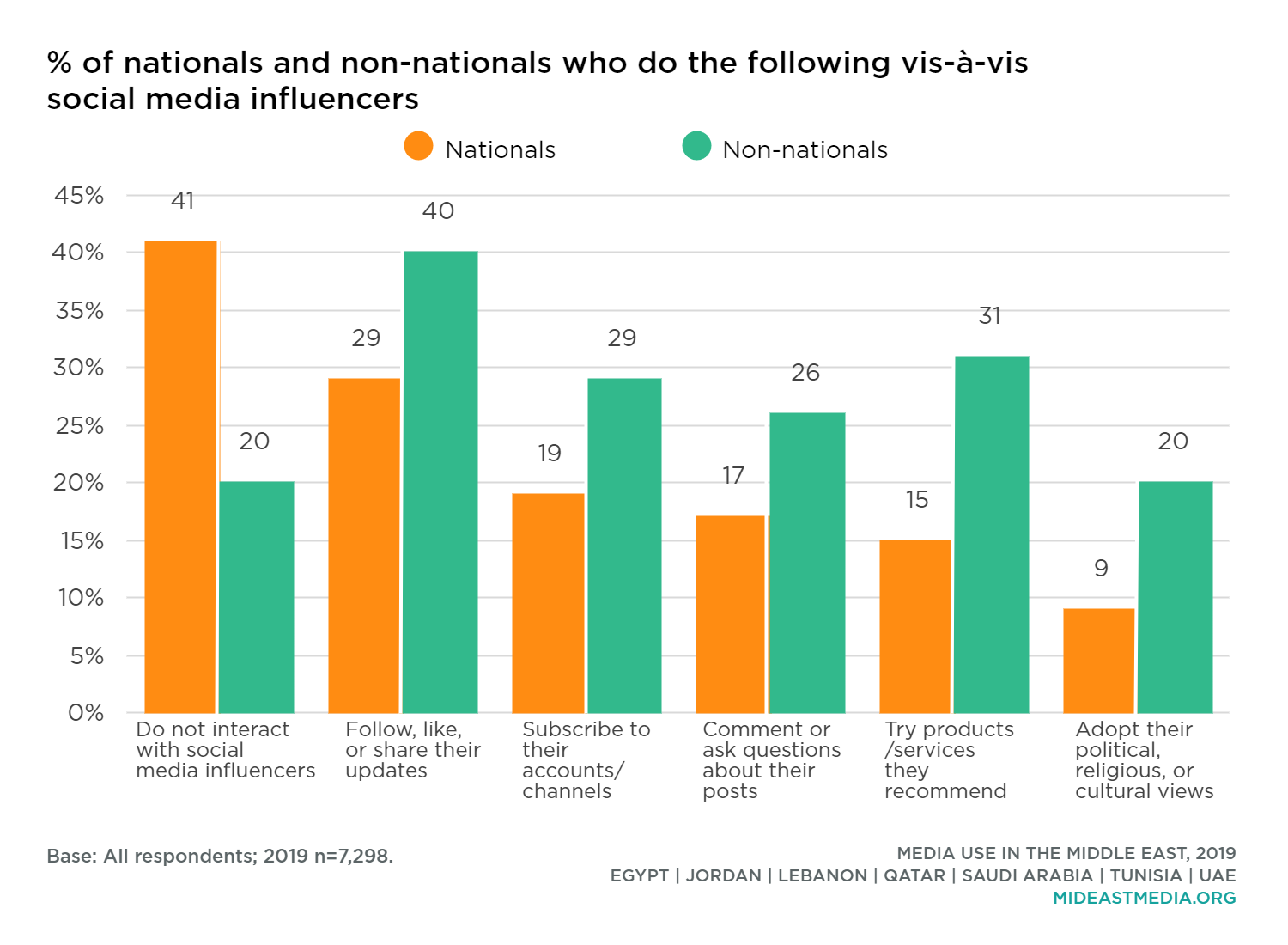
About one in five younger nationals—under 35—say he/she actively engages with social media influencers by subscribing to their platforms/channels, commenting and asking questions, or acting upon their recommendations, compared to less than 10% of those 45 and older. Few nationals in any age group—10% or less—say they adopt the political, religious, or cultural views of social media influencers.
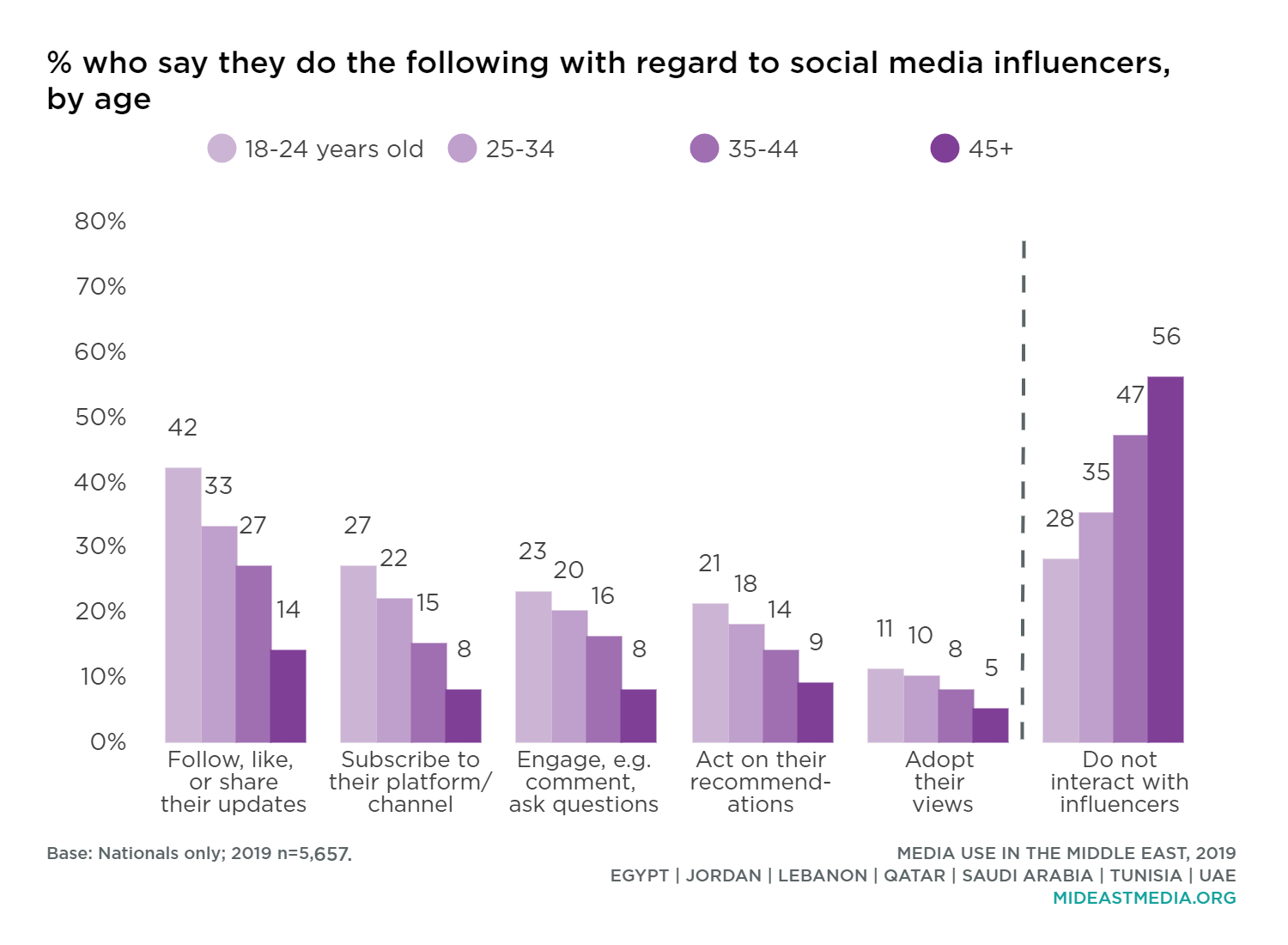
Many nationals are more likely to get news from social media influencers than from newspapers. Greater proportions of Egyptians, Jordanians, Lebanese, and Emiratis get news and information from influencers than from newspapers; whereas Qataris, Saudis, and Tunisians use both mediums in roughly similar proportions. Qataris and Saudis favor newspapers for daily news and information. Nationals from the Gulf states are more likely to use social media influencers for news and information than other nationals (KSA 92%, Qatar 81%, UAE 78% vs. Jordan 57%, Lebanon 52%, Tunisia 52%, Egypt 42%).
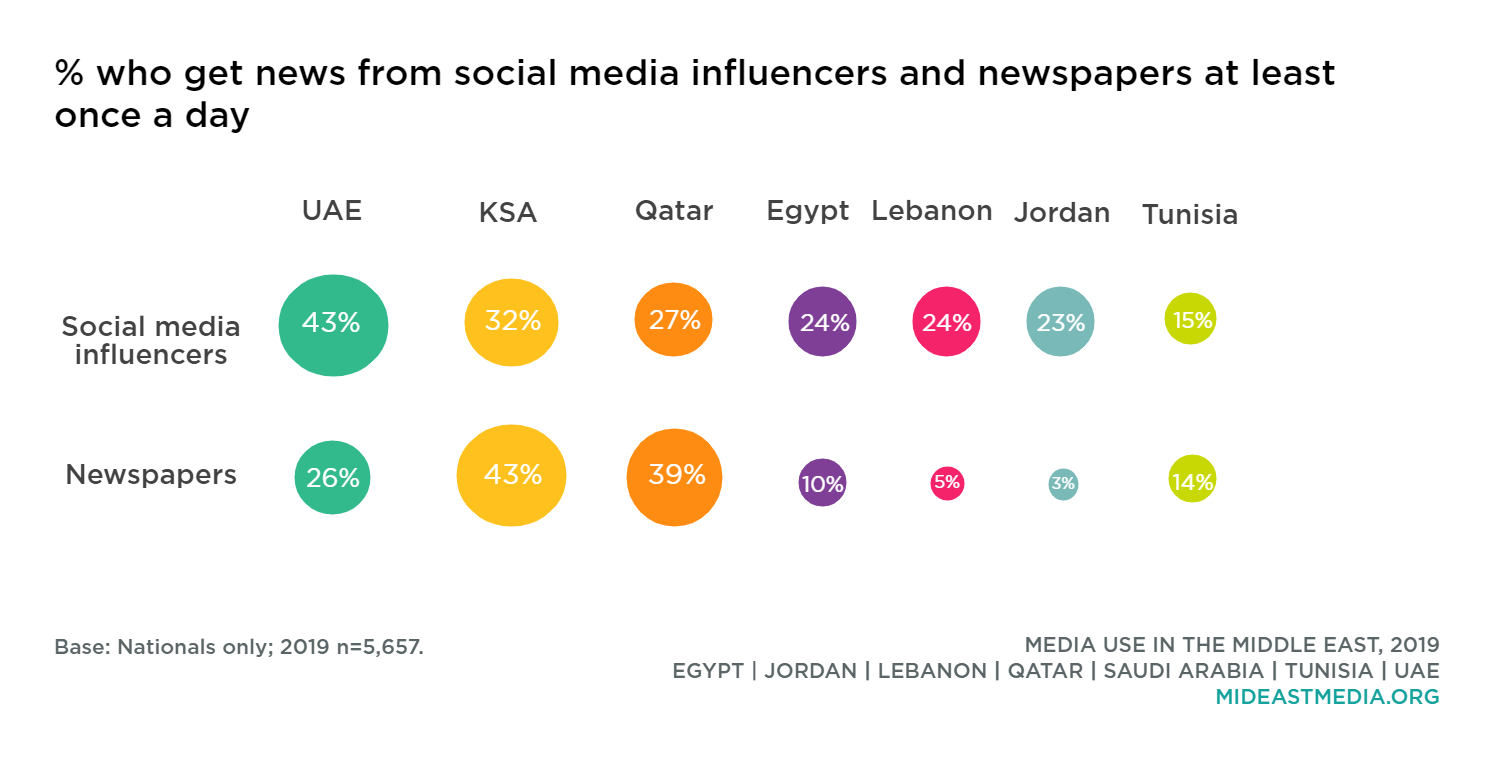
The youngest nationals (18-24) are three times more likely to get news and information each day from social media influencers than from newspapers. In comparison, those 45 and older are more likely to get news and information daily from newspapers (get news and information at least once a day: 18-24 year-olds: 35% influencers vs. 11% newspapers; 25-34 year-olds: 28% influencers vs. 14% newspapers; 35-44 year-olds: 20% influencers vs. 17% newspapers; 45+ year-olds: 13% influencers vs. 20% newspapers).
While the majority of nationals look at content from social media influencers generally, respondents were also asked if they pay particular attention to one social media influencer more than others. When asked which social media influencer comes to mind first, the majority are not able (or do not care) to provide a name. Six in 10 Saudis provide the name of a social media influencer, while fewer than two in 10 Qataris, Tunisians, and Emiratis name a specific influencer.
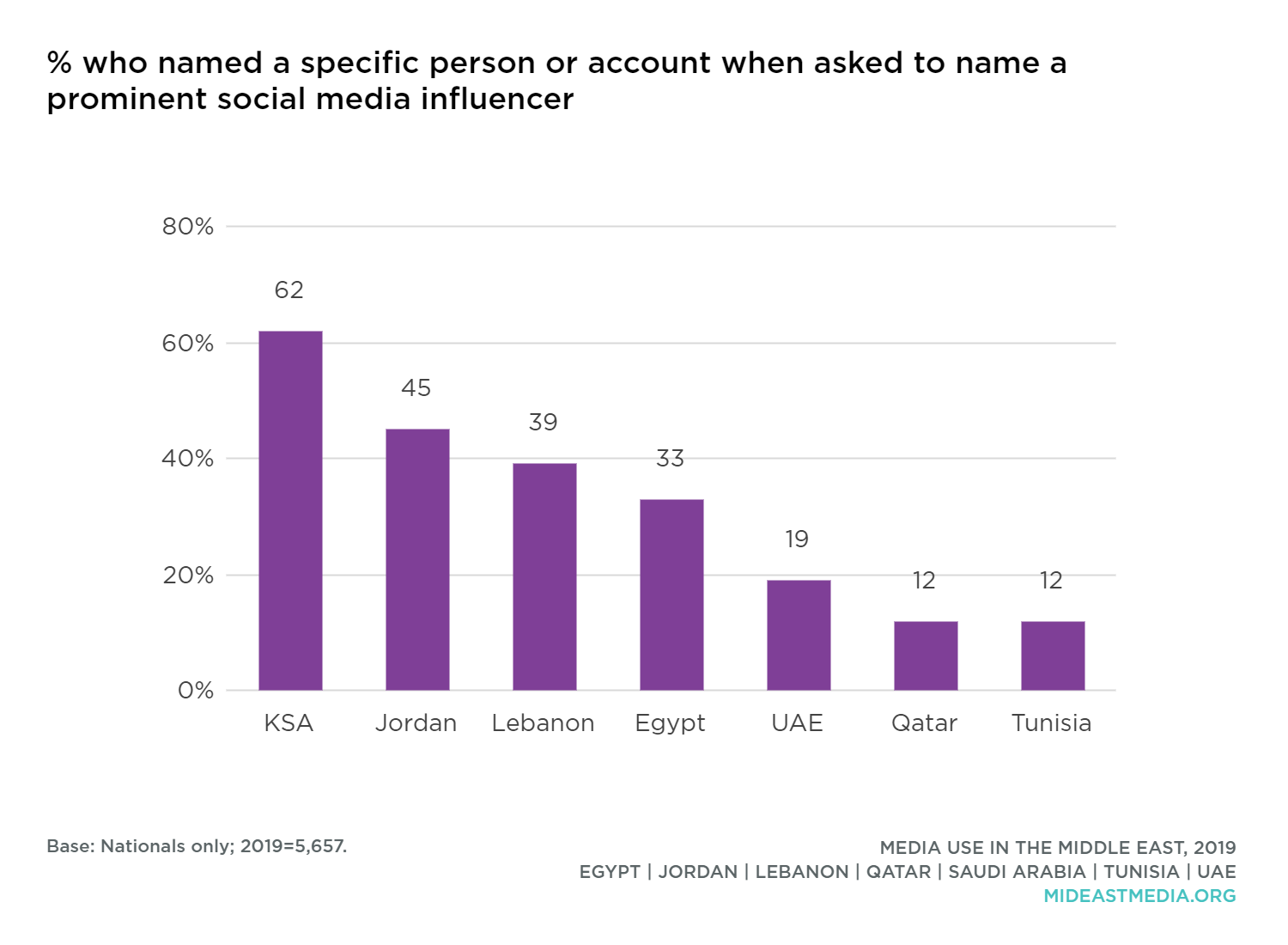
The few social media influencers named with some frequency are:
- Egypt: Mohamed Salah, footballer (3%), Ali Gozlan, politician (2%).
- Jordan: Dr. Mohammad Nouh, scholar and preacher (6%), Mohammad Al Wakeel, media mogul (3%), Dr. Kholoud, fashionista (2%).
- Lebanon: Nancy Ajram, singer (2%), Karen Wazen, fashion and family (2%).
- Qatar: Ahmed Sharif, video producer (2%). Of note, 33% of Western expats and 11% of Asian expats name Ahmed Ibrahim al-Fagih (novelist), 33% of Western expats name Aziz Pasha (activist), 15% of Western expats name Mansour Al Salem (footballer), and 8% of Asian expats name Dr. Kholoud.
- Saudi Arabia: Ali Najem,radio personality (5%), Ahmad Al Shagairi, activist (3%), Secretary of the Lord, politics (3%), Dr. Kholoud (2%), Aziz bin Fahd, royalty (2%), Lubna Olayan, businesswoman (2%). Of note, 6% of Arab expats name Mohammed Assaf (singer) and 5% name Amr Khaled (preacher).
- Tunisia: no one mentioned by 2% or more.
- UAE: Mohamed bin Rashid, politician (3%).